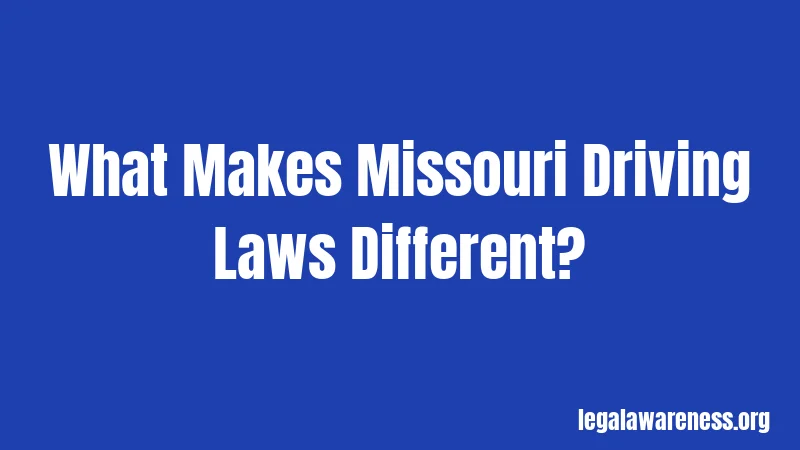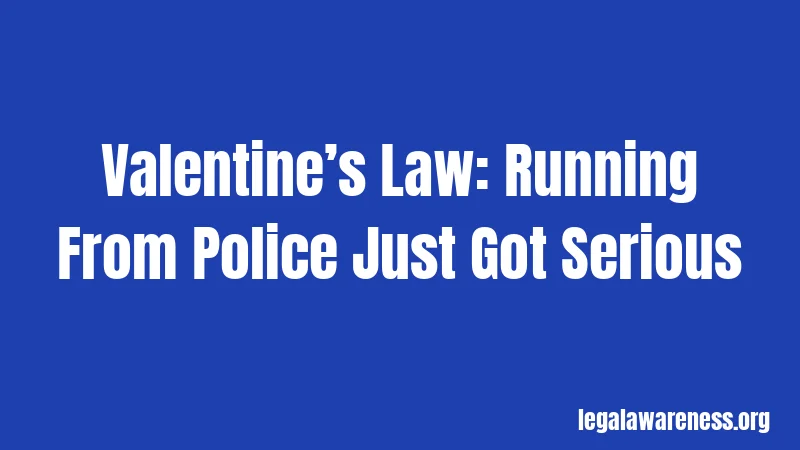Driving Laws in Missouri (2026): The Rules You Can’t Afford to Miss
Most people think they know the driving laws in their state. But Missouri made some major changes recently, and honestly, they might surprise you. From hands-free phone requirements to new safety inspection rules, things are different now. Let’s break down what you actually need to know.
Missouri takes its traffic laws seriously. Break them, and you could face fines, jail time, or lose your license. Stay with me here—this stuff matters more than you think.
What Makes Missouri Driving Laws Different?

Missouri updated several key laws in 2025 and 2026. The state now has strict hands-free phone rules, tougher penalties for fleeing police, and completely changed vehicle inspection requirements.
Here’s the deal. Some of these changes make life easier. Others mean you need to be more careful.
The state passed the Siddens Bening Hands-Free Law back in 2023. But starting January 1, 2025, police can actually ticket you for it. Before that? Just warnings. Now the fines are real.
Hands-Free Phone Law: No More Texting While Driving
Starting in 2025, you can’t hold your phone while driving. Period. The law bans texting, calling without hands-free, recording videos, or just holding your phone in your hand.
Pretty straightforward.
You can still use Bluetooth. You can use voice commands. Just don’t touch the phone.
First offense? Up to $150. Second offense in two years? That jumps to $250. Third offense? You’re looking at $500.
But wait, there’s more to know. This is what they call a “secondary violation.” That means police can’t pull you over just for using your phone. They need another reason first—like speeding or swerving.
Think of it like the seat belt law. They can’t stop you for not wearing your seat belt alone. But if they pull you over for something else, they’ll add that ticket too.
Wondering if this applies to you? It does. Everyone driving in Missouri.
Valentine’s Law: Running From Police Just Got Serious

Valentine’s Law took effect in August 2024. It makes fleeing from a traffic stop way more serious than before.
Here’s what you need to know. If you run from police during a traffic stop and create a substantial risk of injury or death to anyone, that’s now a Class D felony.
Class D felony. Not a misdemeanor.
Gets worse. If someone actually gets injured, it becomes a Class B felony. If someone dies, it’s a Class A felony.
The penalties? Class D means up to seven years in prison. Class B means five to fifteen years. Don’t run from police. Simple as that.
DWI Laws: Missouri Doesn’t Play Around
Missouri calls it DWI—Driving While Intoxicated. Not DUI. The legal limit is 0.08% blood alcohol content for regular drivers.
Commercial drivers? The limit drops to 0.04%. Drivers under 21? Any detectable amount over 0.02% can get you in trouble.
First offense DWI is a Class B misdemeanor. You could face up to six months in jail and a $1,000 fine. Your license gets suspended for 90 days.
Honestly, this is the part most people miss. A second offense within five years? Up to one year in jail. Fines up to $2,000. License revoked for five years.
Third offense? Now it’s a Class E felony. Up to four years in prison. Fines up to $10,000. License revoked for ten years.
Not sure what counts as “operating” a vehicle? Missouri says you don’t even need to be driving. Just sitting in the driver’s seat with the engine running counts. Yep, that’s all it takes.
High BAC Means Bigger Problems
If your BAC is 0.15% or higher, you get enhanced penalties. The state considers this “excessive” BAC. The fines go up. The jail time gets longer.
Missouri law also has something called “implied consent.” That means when you get your license, you agree to take a breathalyzer or blood test if police ask during a DWI stop.
Refuse the test? Your license gets revoked for one year automatically. And they can still charge you with DWI. Plus, your refusal can be used against you in court.
When DWI Becomes a Felony
Okay, pause. Read this carefully. DWI can become a felony even on a first offense if certain things happen.
If you cause serious injury while driving drunk, that’s a Class D or C felony. If you kill someone? Class C felony minimum. Kill a police officer or emergency worker? Class B felony.
These aren’t just fines anymore. We’re talking serious prison time.
A Class C felony means three to ten years in prison. Class B means five to fifteen years minimum.
Speed Limits in Missouri

Missouri has standard speed limits based on the type of road. No signs posted? Here’s what applies:
Rural interstates and freeways—70 mph maximum. Urban interstates and freeways—65 mph. Two-lane numbered highways—60 mph. Two-lane lettered highways—55 mph.
Pretty much standard stuff.
But here’s where it gets tricky. Missouri also has what’s called a “basic speeding law.” This says you can’t drive faster than what’s safe for conditions.
Sound complicated? It’s actually not. Even if the posted limit is 60 mph, you could get a ticket for going 60 if conditions are dangerous. Rain, snow, ice, fog—you need to slow down.
Speeding Tickets and Fines
Speeding 1-5 mph over the limit? That’s just an infraction. No points on your license. Fine is about $50.50.
Speeding 6-10 mph over? $60.50 fine. You get two points. Speeding 11-15 mph over? $70.50 and three points. Speeding 16-19 mph over? $100.50 and four points.
Speeding 20-25 mph over the limit? Now you’re at $155.50 and four points on your license.
Makes sense, right?
Going more than 20 mph over the limit is a Class B misdemeanor. That’s up to six months in jail and a $1,000 fine. Most people just pay the fine. But jail time is possible.
Construction zones make everything worse. The fines double. Seriously.
Vehicle Safety Inspections: Big Changes Coming
Hold on, this part is important. Missouri completely changed its vehicle inspection laws.
Starting January 1, 2026, most personal vehicles don’t need safety inspections anymore. The state eliminated the requirement.
Wait, it gets better. Used to be vehicles needed inspections every two years. Now? If your car is less than 10 years old with under 150,000 miles, no inspection needed.
Older than that? You still need inspections. But way fewer people need them now.
Emissions testing still exists. If you live in St. Louis City, St. Louis County, St. Charles County, Franklin County, or Jefferson County, you still need emissions tests. Federal law requires it. The state can’t change that.
What This Means for You
New registration options too. Starting in 2026, you can choose three-year, five-year, or even permanent registration for your vehicle.
This one’s probably the most convenient change. You could register your car once and basically never deal with it again.
Personally, I think this law makes sense. Newer cars don’t break down as much. The old system was just paperwork.
Seat Belt Laws
Everyone in the vehicle needs to wear a seat belt. Driver and all passengers.
Violating this is also a secondary offense. Police can’t pull you over just for not wearing a seat belt. But if they stop you for something else, expect a ticket.
Fine? Up to $50 plus court costs. The driver pays the fine even if it’s a passenger who wasn’t buckled up.
Yep, that’s right. You’re responsible for everyone in your car.
Graduated Driver License for Teen Drivers
Missouri has strict rules for drivers under 18. They call it the Graduated Driver License law.
At 15, teens can get an instruction permit. They need to pass vision, road sign, and written tests. They must hold the permit for at least 182 days.
Wondering who can ride with them? Someone 21 or older with a valid license must be in the front seat.
At 16, they can get an intermediate license. This lets them drive alone—except during the late-night curfew from 1 a.m. to 5 a.m.
Wait, there’s an exception. They can drive during curfew if going to work, school events, or emergencies. They can also drive with immediate family members.
At 18, they can apply for a full license. They need to have had their intermediate license with no violations for at least six months before their 18th birthday.
Senior Driver Requirements
Drivers 70 and older have special requirements. Totally makes sense given the safety concerns.
They must renew their license every three years instead of six. Younger drivers get longer renewal periods.
They also have to take the road sign recognition test every time they renew. Most drivers only take it once when they first get their license.
Not sure if this will affect someone you know? If they’re 70 or older, it will.
Stunt Driving and Street Takeovers
New law as of August 2025. Stunt driving or participating in a “street takeover” is now illegal.
What counts as stunt driving? Doing donuts in intersections. Drifting on public roads. Blocking traffic for car stunts. All that stuff you see in videos.
First offense comes with points on your license. Multiple offenses? The penalties get worse fast.
Other Important Traffic Laws
Running a red light or stop sign? You must come to a complete stop before the stop line, crosswalk, or intersection.
Right turn on red is allowed unless a sign says otherwise. Just come to a complete stop first.
Following too close is illegal. Improper lane changes are illegal. Not using turn signals? Also illegal.
These might seem like small things. But they add up. Get too many violations and you’ll lose your license.
Points System and License Suspension
Missouri uses a point system. Different violations add different points to your record.
Get eight points in 18 months? Your license gets suspended. The length depends on how bad your record is.
First suspension is 30 days. Second is 60 days. Third is 90 days.
Points stay on your record for three years. After that, they drop off.
You can take a driver improvement course to reduce points. But you can only do this once every three years.
Traffic Stop Rights
If police pull you over, you have certain rights. You must show your license, registration, and proof of insurance.
You don’t have to answer questions beyond basic identification. You can decline to consent to a search of your vehicle.
Stay calm. Keep your hands visible. Don’t argue with the officer.
How to Handle a Traffic Ticket
Got a ticket? You have options. You can pay the fine and accept the points. This is basically pleading guilty.
You can also go to court and fight it. Sometimes worth it for serious tickets.
Or you can hire a lawyer. For DWI or felony charges, you definitely should.
Missouri allows pleading down some charges. A lawyer can help negotiate reduced penalties.
Penalties for Driving Without a License
Driving without a valid license is a crime. First offense is a Class D misdemeanor. Up to $500 fine.
Driving with a suspended or revoked license is worse. Class A misdemeanor. Up to $2,000 fine and one year in jail.
Don’t mess around with license issues. The penalties escalate fast.
Road Conditions and Winter Driving
Missouri law requires you to adjust your speed for conditions. Ice, snow, rain, fog—all require slower speeds.
Honestly, this is just common sense. But legally, you can get a ticket for going the speed limit if conditions are bad.
What to Do After an Accident
If you’re in an accident, you must stop. Leaving the scene is illegal.
You need to exchange information with the other driver. Name, license number, insurance info.
For serious accidents, call 911. You’re required to report accidents that cause injury, death, or over $500 in damage.
Hit and run is a serious crime. Don’t leave. The penalties are way worse than whatever you’re worried about.
Getting Your License Reinstated
Lost your license? You’ll need to complete certain requirements to get it back.
For DWI, you usually need to complete a substance abuse program. You might need an ignition interlock device. You’ll definitely need to pay fees.
For other suspensions, you might just need to pay a fee and wait out the suspension period.
Frequently Asked Questions
Can I use my phone at a red light in Missouri? No. The hands-free law applies whenever you’re operating a vehicle. Even at red lights. Put the phone down or use hands-free.
What happens if I refuse a breathalyzer test? Your license gets automatically revoked for one year. You can still be charged with DWI. Your refusal can be used against you in court.
Do I need a safety inspection for my 2020 car in 2026? No. Starting January 1, 2026, vehicles less than 10 years old with under 150,000 miles don’t need safety inspections.
How long do points stay on my Missouri driving record? Three years from the date of conviction. After that, they automatically drop off.
Can police pull me over just for not wearing a seat belt? No. Seat belts and hands-free phones are secondary violations. Police need another reason to pull you over first. But they can add those tickets once they stop you.
What’s the difference between DWI and DUI in Missouri? Missouri primarily uses DWI. DWI typically refers to alcohol impairment. DUI can include drugs. But legally, they’re treated very similarly.
How much is a first-time DWI in Missouri? Up to six months in jail, $1,000 fine, and 90-day license suspension. Plus you’ll pay for substance abuse programs and might need an ignition interlock device.
Can I get a DWI for sitting in a parked car? Yes. If the engine is running and you’re in the driver’s seat, that counts as “operating” a vehicle under Missouri law.
What counties in Missouri require emissions testing? St. Louis City, St. Louis County, St. Charles County, Franklin County, and Jefferson County require emissions testing. Federal law requires it.
How fast can I drive on Missouri highways? Rural interstates—70 mph max. Urban interstates—65 mph. Always adjust for conditions. The speed limit isn’t safe if it’s raining, snowing, or foggy.
Final Thoughts
Missouri’s driving laws changed a lot recently. The hands-free phone law is now enforced with real tickets. Vehicle inspections got much simpler. DWI penalties are harsh.
Stay informed, drive safely, and when in doubt, slow down or ask a lawyer. You’re not alone if this seems overwhelming. Most people don’t know half these rules until they get a ticket.
Drive smart out there.
References
- Missouri Department of Revenue – Driver License Law Changes: https://dor.mo.gov/driver-license/law-changes/
- Missouri Revised Statutes – DWI Laws (Section 577.010): https://revisor.mo.gov/main/OneSection.aspx?section=577.010
- FOX 2 News – New Missouri Laws for Drivers 2025: https://fox2now.com/news/missouri/three-new-missouri-laws-for-drivers-to-know-for-2025/
- Missouri Department of Revenue – DWI Information: https://dor.mo.gov/driver-license/revocation-reinstatement/dwi.html
- Missouri Revised Statutes – Speed Limits (Section 304.010): https://revisor.mo.gov/main/OneSection.aspx?section=304.010

Is it legal to drive a car/truck with an automatic transmission with both feet??